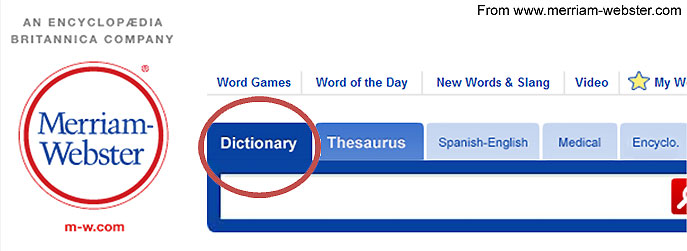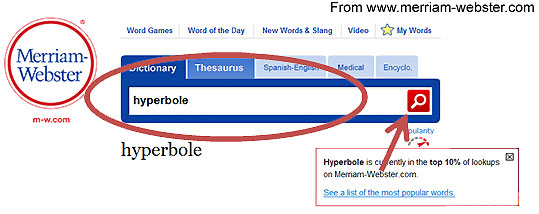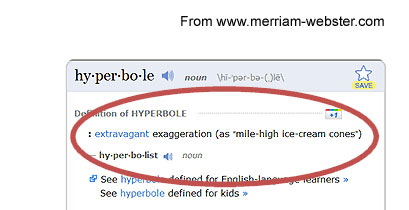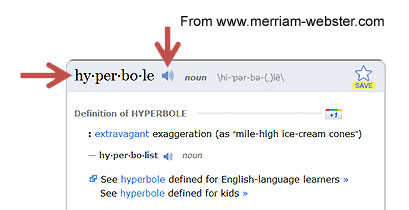If you need more information than your word processing program can provide but still want to use your computer, you can check online dictionaries and thesauruses. These resources are similar to their print counterparts, but they often have many extra features to assist you in choosing synonyms, antonyms, the correct part of speech for a word, and much more.
Other online dictionaries are available, but let’s use the Merriam-Webster dictionary and thesaurus to look up a word. This resource also includes a listening feature that actually lets you hear how a word is pronounced.
Step 1: Look up the word hyperbole as it is used in this sentence: “My best friend Thomas included hyperbole after hyperbole when he talked about his accomplishments.” Go to this web address: http://www.merriam-webster.com. To use the dictionary, click the dictionary tab (shown below).

Step 2: The word that you are looking up is hyperbole. Type it into the field below the Dictionary tab and press the button to the right of the word to begin your search. (The red arrow in the picture below indicates the button).

Step 3: Find the correct definition and review the other features available to you. The correct definition, in this case, is circled for you. Hyperbole means an “extravagant exaggeration.”

Step 4: What else do you notice on the page? The bar above the definition offers explanations of how the word is pronounced phonetically. To hear it pronounced, press the speaker button to hear an audio version of the word.

Step 5: Other features on the page include a thesaurus, synonyms, antonyms, etymology, and a helpful video tutorial. The thesaurus helps you find words that are similar to the word you are looking up. The “synonyms” option shows you a brief list of words that are similar, including words that have similar connotative power. The antonym list includes words that contain the opposite meaning of the word. The video tutorial in the upper right-hand corner features interesting lessons on word meaning and how to use the dictionary along with other helpful information.
On the dictionary page below, see if you can find the thesaurus button, video tutorial, etymology, synonyms, and antonyms for the word “hyperbole.” A circle and arrow will verify the location of each when you mouse over them.
Let’s go back to the sentence that used the word hyperbole: “My best friend Thomas included hyperbole after hyperbole when he talked about his accomplishments.” Now that you have found the definition of hyperbole, what does the word have to do with Thomas talking about his accomplishments?
 Use your notes to write your answer. When you’re finished, check your understanding to see a possible response.
Use your notes to write your answer. When you’re finished, check your understanding to see a possible response.Sample Response:
If you said that hyperbole is used because Thomas bragged or exaggerated about all that he had accomplished, you’re right!
Read the quotations that follow. Next, answer the questions about each quotation with the help of Merriam-Webster’s online dictionary. As you research each word, pay close attention to how it is used and review any information that may be available in the dictionary description.
Whenever I begged for food now my mother would pour me a cup of tea which would still the clamor in my stomach for a moment or two; but a little later I would feel hunger nudging my ribs, twisting my empty guts until they ached.
- What part of speech is clamor?
- What word is synonymous with clamor and could be used in this sentence?
- Look up the etymology of clamor. What is its origin?
- What is an antonym of the word clamor?
She was one of the few gentlewomen I have ever known, and has remained throughout my life the measure of what a human being can be.
- What part of speech is measure?
- The word measure refers to the person’s—
Now answer the following questions, which are unrelated to the two preceding passages.
- Which word related to officious has negative connotative power?
- Which word related to elucidate has positive connotative power?
- “In school, he is known as a total cutup, but he actually has a benign nature.” In this sentence, benign means—